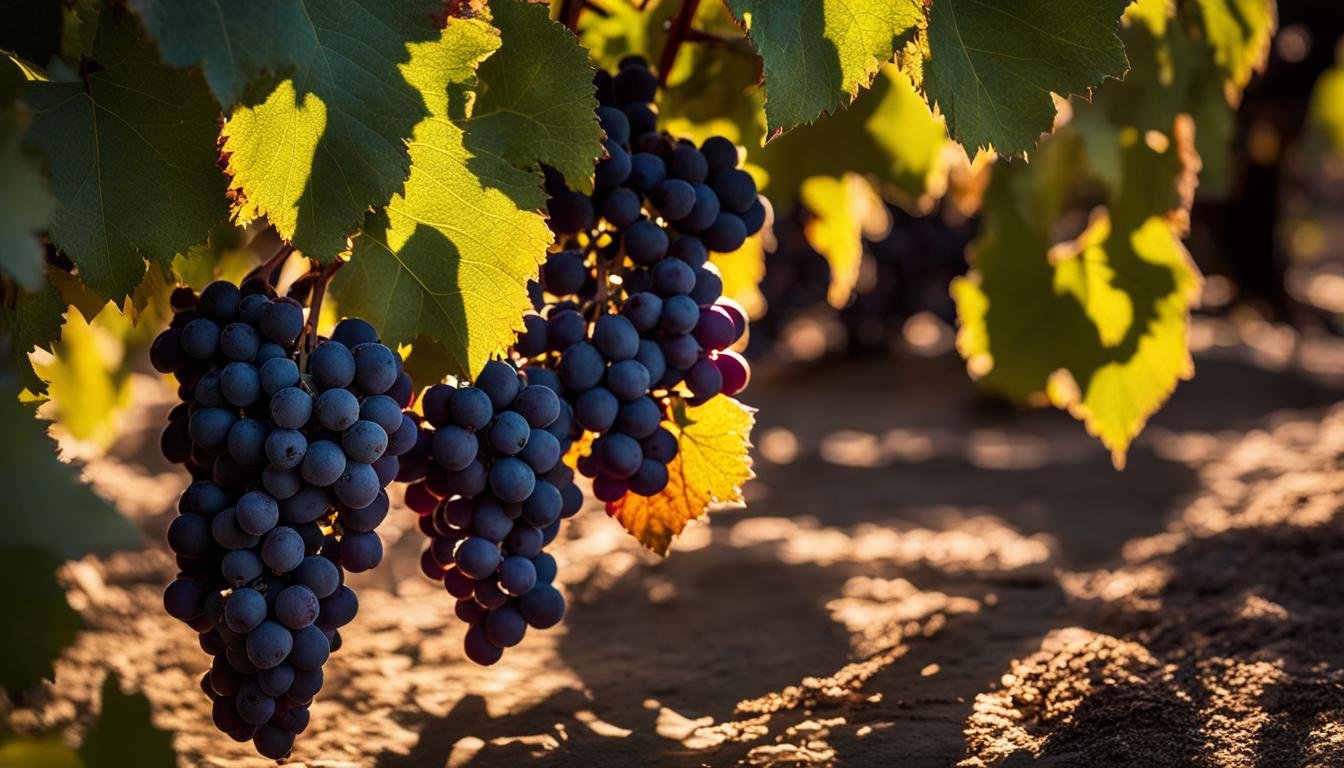This post may contain affiliate links. Please read my disclosure policy.
Mourvèdre: The Rugged Storyteller of the Vineyard
Introduction
Mourvèdre, pronounced “More-ved-ruh,” is akin to the rugged, seasoned traveller of the wine world – full of stories, depth, and character. Known for its significant role in many acclaimed blends and as a stand-alone varietal, this grape is as complex as it is captivating. Join us on a journey into the world of Mourvèdre – a wine that brings tales of ancient soils and sun-soaked vineyards to life.
Primary Flavours
Sampling Mourvèdre is like delving into a treasure trove of sensory experiences. It greets you with a rich tapestry of dark fruit flavours, including blackberry, plum, and black cherry, complemented by nuances of black pepper, thyme, and a hint of game. There’s an inherent earthiness, evocative of a walk through a forest at dusk, adding layers of intrigue and complexity.
Taste Profile
| Mourvèdre | Mourvèdre | Mourvèdre |
|---|---|---|
| Aspect | Rating out of 5 | Characteristic |
| Sweetness | 🍷 | Dry, with a mysterious hint of dark fruit |
| Body | 🍷🍷🍷🍷🍷 | Full-bodied, as commanding as an orchestra's crescendo |
| Tannins | 🍷🍷🍷🍷 | Bold and gripping, like a firm handshake |
| Acidity | 🍷🍷🍷 | Moderately high, adding a lively twist |
| Alcohol by Volume | 🍷🍷🍷🍷 | Often 13-15%, as warming as a woolen blanket |
Growing Regions
Mourvèdre thrives in warm, sunny climates, finding its most renowned expressions in the Bandol region of Provence, France. It’s also a vital component of many Southern Rhône blends, including those of Châteauneuf-du-Pape. Beyond France, Mourvèdre has found a welcoming home in Spain (where it’s known as Monastrell), Australia, and California, each region adding its unique brushstroke to the Mourvèdre canvas.
Origin and Global Presence
Originating from Spain, Mourvèdre’s journey through the vineyards of the world is a story of resilience and adaptability. In France, it has become synonymous with the prestigious wines of Bandol, where it showcases its ability to produce wines of great depth and aging potential. As it has travelled, Mourvèdre has adapted to various climates and terroirs, showcasing different aspects of its versatile personality.
Serving Temperatures
To truly savour the depth and complexity of Mourvèdre, it’s essential to serve it at the correct temperature, ideally between 16-18°C (61-64°F). This range is the sweet spot where the wine’s myriad of flavours and enticing aromas are showcased most effectively. Serving it too cool may mask some of its nuanced characteristics, while too warm a temperature can amplify the alcohol, overshadowing its elegant complexity.
At this optimal temperature, Mourvèdre’s rich bouquet and full-bodied palate can be fully appreciated, allowing the wine to express its true character and the subtleties that make it so unique.
Glassware
Choosing the right glass for Mourvèdre significantly enhances the tasting experience. A large wine glass with a generous bowl is most suitable for this robust varietal. This style of glassware provides ample space for the wine to aerate, which is crucial for softening Mourvèdre’s pronounced tannins and allowing its full range of flavours to unfold.
The wide bowl also plays a vital role in concentrating the wine’s complex aromas, capturing and elevating the subtle scents to the nose. This makes each sip a delightful experience, where both the aroma and flavour profiles are experienced in harmony, heightening the enjoyment of this rich and intricate wine.
Decanting
Decanting Mourvèdre can significantly enhance its drinking experience, especially for the more tannic or aged examples. An hour in a decanter allows the wine to breathe, mellowing the tannins and fully releasing its diverse array of aromas and flavors. For younger wines, a shorter decanting time suffices, letting their vibrant fruitiness shine.
Ageing Potential
This is a grape that matures gracefully, developing an even more fascinating character over time. With ageing, the initially bold fruit flavors evolve into more complex notes of leather, truffle, and spice. This transformation makes Mourvèdre a fascinating choice for collectors and enthusiasts, offering a different experience with each passing year.
Food Pairings
Embarking on a culinary pairing journey with this bold varietal is like setting off on a flavour-filled adventure. Its assertive character makes it a fantastic match for hearty dishes. Picture yourself enjoying this wine with rich game meats – it’s like bringing a full orchestra to a quiet dinner! The robust profile of the wine perfectly complements the depth of venison or wild boar, transforming each bite into a culinary celebration.
Spicy sausages, brimming with flavours and spices, reach new heights when paired with this wine. Its spicy undertones and full body skilfully balance the heat and richness of the sausage, creating a dynamic and satisfying combination. Planning a barbecue? This varietal is your top pick, enhancing everything from grilled meats and vegetables to those irresistibly good barbecued ribs.
Vegetarians aren’t left out in this flavour fest. The earthy tones of the wine beautifully complement plant-based dishes like lentil stews or grilled portobello mushrooms. These combinations create a delightful harmony, where the robust character of the wine elevates the earthiness of the mushrooms.
Cheese aficionados, rejoice! This varietal mingles wonderfully with robust and aged cheeses. Imagine a mature Cheddar or Gouda engaging in a flavourful dance with the wine’s tannins – it’s an indulgent and playful pairing.
In essence, pairing this varietal with food is about exploring and enhancing flavours, creating combinations that are as enjoyable as they are memorable. Whether it’s a hearty meat dish, a vegetarian creation, or a selection of cheeses, this varietal elevates the dining experience, making each meal an occasion to remember.
Celebrated Producers
| Mourvèdre | Mourvèdre | Mourvèdre |
|---|---|---|
| Country | Wine Label | Varietal Name & Style |
| France | Château de Beaucastel | Elegance and Complexity, Châteauneuf-du-Pape |
| Spain | Bodegas Juan Gil | Vibrant, Expressive Spanish Monastrell |
| USA | Tablas Creek Vineyard | Californian Innovation, Rhône-style Mastery |
| Australia | Yangarra Estate | New World Boldness, Rich and Intense |
| South Africa | Sadie Family Wines | Artisanal, Terroir-Driven South African |
| These wineries stand out for their masterful interpretations of Mourvèdre. Each one contributes a distinct touch to the grape, highlighting its versatile nature. From the traditional and robust expressions by Château de Beaucastel to the vibrant and expressive Monastrells of Bodegas Juan Gil, the range is impressive. Tablas Creek Vineyard in the USA brings Californian innovation to Rhône-style winemaking, while Yangarra Estate in Australia showcases the varietal's New World boldness and intensity. Sadie Family Wines in South Africa offers an artisanal, terroir-driven approach, further exemplifying Mourvèdre's global appeal and adaptability. | These wineries stand out for their masterful interpretations of Mourvèdre. Each one contributes a distinct touch to the grape, highlighting its versatile nature. From the traditional and robust expressions by Château de Beaucastel to the vibrant and expressive Monastrells of Bodegas Juan Gil, the range is impressive. Tablas Creek Vineyard in the USA brings Californian innovation to Rhône-style winemaking, while Yangarra Estate in Australia showcases the varietal's New World boldness and intensity. Sadie Family Wines in South Africa offers an artisanal, terroir-driven approach, further exemplifying Mourvèdre's global appeal and adaptability. | These wineries stand out for their masterful interpretations of Mourvèdre. Each one contributes a distinct touch to the grape, highlighting its versatile nature. From the traditional and robust expressions by Château de Beaucastel to the vibrant and expressive Monastrells of Bodegas Juan Gil, the range is impressive. Tablas Creek Vineyard in the USA brings Californian innovation to Rhône-style winemaking, while Yangarra Estate in Australia showcases the varietal's New World boldness and intensity. Sadie Family Wines in South Africa offers an artisanal, terroir-driven approach, further exemplifying Mourvèdre's global appeal and adaptability. |
FAQ’s
What are some interesting facts about Mourvèdre?
Mourvèdre, a grape known for its deep color and strong, meaty flavours, is native to Spain, where it’s called Monastrell.
It’s a key component in many Rhône and Provence blends, including Châteauneuf-du-Pape.
The grape thrives in warm, sunny climates and produces full-bodied wines with flavours of dark fruit, pepper, and spices.
Mourvèdre is often used in blends to add complexity and structure but is also valued as a varietal wine in regions like Bandol, France.
Is Mourvèdre a red or white wine?
Mourvèdre is a red wine grape, typically used to produce robust, full-bodied red wines.
Where does the name Mourvèdre originate from?
The name Mourvèdre is believed to have originated from Murviedro near Valencia in Spain. The grape’s Spanish name, Monastrell, likely comes from the Latin ‘Monasteriellu’, denoting its historical cultivation near monasteries.
Is Mourvèdre known by any other names?
Mourvèdre is known as Monastrell in Spain and Mataro in Australia and parts of the United States. These names reflect regional variations and historical references to the grape.
Which country produces the most Mourvèdre?
Spain, particularly in the Murcia and Valencia regions, is the largest producer of Mourvèdre, known there as Monastrell. France, especially in the Rhône and Provence areas, also grows this grape extensively.
Conclusion
Mourvèdre is more than just a wine; it’s an exploration of the rugged and the refined. It’s about savouring the bold, the complex, and the earthy. So, when you next pour a glass of Mourvèdre, be prepared for a journey that’s as rich and rewarding as the landscapes from which it hails. It’s the wine that promises – and delivers – an adventure in every bottle.
User Review
( votes)Sip smarter, subscribe now!
Subscribe for gourmet tips, event updates, travel ideas, and a free e-book on Food Pairings. Start your journey to culinary and travel excellence!













